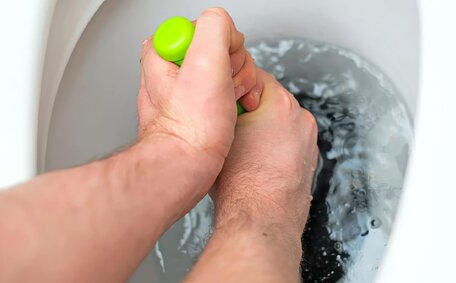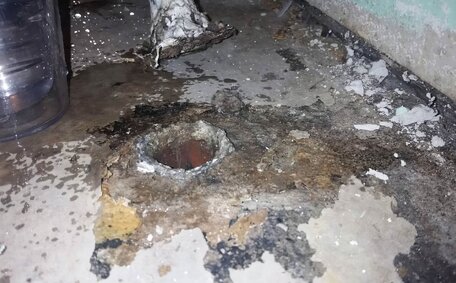Where Does Grease in Kitchen Drains Come From?
Kitchen sink drains commonly suffer from the disposal of cooking oil grease, originating from ingredients such as cooking oils, butter, meat by-products, condiments, dairy, and baking components. When substances such as fat and grease from unclean cookware enter your kitchen sink, they accumulate in the plumbing system’s complex pipework.
Many homeowners believe that hot liquid fat and grease, which are among the most common causes of blocked pipes, will safely flow down the sink. However, once cooled to room temperature, these substances can solidify and cling to pipe interiors.
Layers of accumulated fat, oils, and grease can, over time, narrow pipe diameters, leading to water flow blockages.
Food scraps going down the sink exacerbate the accumulation of grease and fat, further contributing to blockages as they break down. Bits of meat, dairy products, and blocked fat mingling with oils and grease enter your drain, creating an environment where vinegar hot water treatments may assist in breaking down the buildup.
Sanitary products such as lotions, conditioners, and creams, replete with moisturising elements, contribute additional grease into the drain pipe during rinsing, where a baking soda vinegar solution may be used as a maintenance method. When amalgamated with soap scum and hair food debris, these oily substances morph into a dense sludge within the pipes.
How Grease and Fat Build Up Over Time
As fats, oils and grease are poured into drain of your kitchen sink and its connected drains over spans of Time, they accumulate and form layers within the drainage system. These slick oils and fats adhere to pipe interiors and can solidify due to cooling from temperature changes.
Continuously pouring fat, oil, and grease into the sink leads to dense build-ups that block the drain, disrupting water flow. Food debris, such as coffee grounds, contribute additional fat and grease while further narrowing pipe diameter as particulates accumulate. Dairy residue, meat drippings, and a combination of fat, grease from cooking oils and butters, wash down from dirty dishes and deposit inside drains over time.
Regularly disposing of fatty substances in sink water quickens residue accumulation, more swiftly constricting pipes. Oily films catch soap buildup and interact with pipe minerals to form blockages faster. Accumulations of grease can impede drainage significantly, yet adding boiling water down the pipes can occasionally help, Although merging with food and soap residue, pouring boiling hot water down occasionally might dislodge minor clogs, despite it being one of the most arduous problems to address.
As the pipes become constricted by grease layers, water struggles to pass through the residue in the sink drain. Grease, fat, and oil debris eventually accumulate to completely plug the constricted drain opening. Lacking sufficient pipe diameter for water transition, the drainage flow halts completely, and these obstructions can damage your plumbing system as sinks commence to overflow.
Why Grease and Fat Cause Drain Clogs
Grease and fat easily clog kitchen sinks and hot water systems by solidifying upon cooling. Fats that cool and solidify create stubborn layers clinging to pipe interiors, challenging to dissolve even with hot water.
Unlike other substances that break down in water, oils and greases retain their solid state when cooled and resist being washed away in the drain. Their thick consistency, when comes to trapping debris, enables fat, oil, and grease to trap other debris and accumulate gradually within pipes.
Fatty deposits gradually restrict water flow, leading to decreased drain performance and eventual blockages, even from small amounts. Small grease disposal amounts seem harmless at first but amass over time into obstructive sludges.
Grease firmly coating pipe walls can result in blockages from adhering tree roots, toilet paper, and other debris. Restricting flow also makes pipes prone to backups during heavier use that exceed narrowed drain capacity.
Unchecked grease-induced blockages, stemming from improper disposal, can lead to significant plumbing repairs over time. Persistent buildup is a common cause blocked drains occur, resulting in pipe corrosion, mould, mildew, and cracks as infrastructure integrity degrades.
Signs You Have a Grease-Clogged Drain
- Slow draining water that persists can signal plumbing concerns—our experts recognise this as a classic sign of blockages, especially if sinks take very long to empty.
- Gurgling sounds coming from drain pipes as water struggles passing through sink clogged grease.
- Unpleasant sewer gas odours emanating from your bathroom sink which can cause discomfort due to backed-up wastewater.
- Overflowing water in your sink clogged due to accumulated grease, causing it to fill up and empty sluggishly.
- Salt and baking soda vinegar solutions, akin to the effectiveness of a drain cleaner, are frequently found wanting in clearing tenacious clogs.
- Plungers providing only temporary relief before drainage issues return.
- Outside sewer vents bubbling during dish washing or showers.
- Clogged drains after washing greasy pots and pans.
- Pools of water on sink bottoms after draining stops completely.
How to Prevent Grease from Entering Drains
Several effective strategies can prevent oil pouring down the drain and the resulting blockages:
- Meticulously wipe cookware, dishes and cutlery with paper towels before cleansing to sweep away the cooking remnants, ensuring not a single fat down drain your drains.
- Dispose of grease by pouring it into a sealable container and discarding it in the rubbish bin after it solidifies.
- Install fat trap catchers in the sink, the best way to collect food waste, then regularly clear out your captured material into compost or rubbish bins.
- To avoid pouring grease into the drain, mix greasy pan residues with absorbent materials like cat litter or paper and dispose of in bins when soaked through.
- Gather bacon grease, meat fats and excess cooking oil in jars to prevent them from going oil down sink, enabling proper disposal or potential reuse.
- Scrape plates and pans meticulously before rinsing to ensure greasy residue doesn’t go down into the drains.
- Educate household members on best practises for grease disposal and the consequences of pouring fats and oils into your drain.
Implementing these simple, proactive steps will minimise fats, oils and grease from accumulating in drains and prevent expensive plumbing emergencies.
Proper Disposal Methods for Fats and Oils
To properly dispose of fats, oils, and grease without damaging drains, let them solidify before putting them in your bin for council collection.
For quick disposal, pour warm oil and grease into a sturdy container, letting it solidify before tossing it into the trash.
- For small amounts of grease or bacon fat, placing a paper towel in the container helps absorb the liquid pre-disposal.
- Avoid filling the grease container fully due to expansion during cooling and solidification phases.
- Secure lids on grease containers to prevent spills, leaks and smells from wafting throughout your home.
Once oils, fats, and greases solidify, resembling hardened margarine or thick tallow, ensure they are poured down drain directly into your household bin for the weekly council collection.
For substantial waste amounts, investing in a grease trap offers safe outdoor storage until collection, ensuring proper disposal. Professional disposal specialists collect and sustainably convert waste grease into usable biofuel, taking the hassle out of accumulation management.
Remember, one should never pour oil down drain or into your sink or garbage disposals, even when warm and liquid, as this invites inevitable blockages over time.
When to Call a Professional for Grease Drain Cleaning
Engage a skilled plumber to clear clogged drains when DIY methods fall short. A professional can employ high-pressure techniques for extensive accumulations of fat and oil in drains that exceed home remedy limitations.
Over time, grease layers shrink the pipe’s diameter, making it increasingly difficult for DIY remedies like drain cleaners, plungers, and high-pressure hoses to remove the dense, solidified blockages. Short-term home remedies are temporarily effective but may lead to re-clogging from residual grease.
Professional assistance with chemical drain equipment ensures the dissolution of resilient grease clogs. Techniques like hydrojetting clear pipes with pressurised water jets, removing long-term grease build-up.
Sydney homeowners facing severe drainage issues from excessive grease and fat can turn to their local Dural Plumbing team, which specialises in removing stubborn clogs. Available 24/7 for emergencies, their expert technicians leverage the latest tools to restore free drainage flow throughout pipes.
Environmental Impact of Grease in Sewers and Waterways
When fats, oils, and grease (FOG) make their way down drains into sewage systems, they can significantly harm the environment if not disposed of correctly.
As grease fat oil journeys through sewer pipes, it often cools off and solidifies en route, clinging tenaciously to the infrastructure of the pipe walls. Over time, thick layers of hardened grease accumulate in municipal sewer lines, restricting flow.
As more cooking oil, grease, and fat infiltrate the sewer system, obstructive deposits converge, forming mammoth clumps known as "fatbergs". These grease blockages grow to the point where they completely plug infrastructure, causing sewage backups and sanitary sewer overflows (SSOs).
SSOs release untreated wastewater containing harmful bacteria, chemicals and pollution directly into waterways. This pollution can lead to environmental harm and the deterioration of local ecosystems.
Wastewater treatment plants face difficulties when high volumes of grease enter their systems. Grease can hamper equipment, clog processes and force operations over capacity.
Households can mitigate the risks of fatbergs, overflows, and treatment problems by properly disposing of grease instead of pouring it down sinks.
Elementary measures such as solidifying cooking grease and discarding in waste collection helps lessen ecological effects and shields Australia’s wastewater facilities and waterways from pollution running down your sink.






